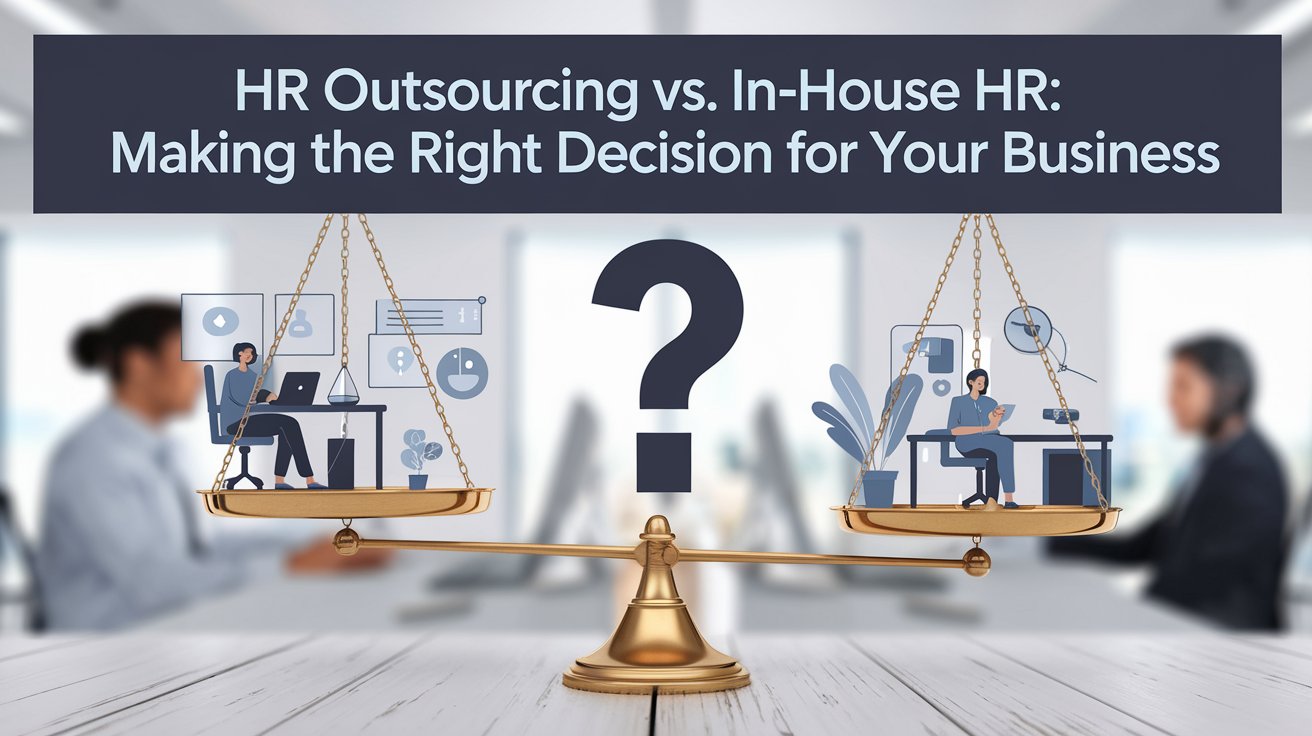HR Outsourcing vs. In-House HR: Making the Right Decision for Your Business
Human Resources (HR) plays a vital role in managing and supporting the most valuable asset – the employees. HR encompasses various functions, ranging from recruitment and training to employee engagement and compliance.
As businesses grow and evolve, they face a critical decision: whether to outsource HR functions or maintain an in-house HR department.
HR outsourcing involves delegating certain HR functions to external service providers, specialized in delivering HR services. On the other hand, in-house HR refers to establishing an internal HR department within the organization to handle all HR-related tasks.
HR is the backbone of any successful organization. It is responsible for attracting top talent, fostering a positive work environment, promoting employee development, ensuring compliance with labour laws, and resolving conflicts.
A well-managed HR function significantly impacts employee satisfaction, retention, and ultimately, the company’s overall performance.
HR Outsourcing
HR outsourcing involves partnering with third-party providers to handle specific HR tasks and responsibilities. Several HR functions are commonly outsourced, including payroll processing, benefits administration, recruitment and staffing, training and development, and employee performance management.
In-House HR
In-house HR involves establishing a dedicated HR department within the organization, staffed by HR professionals who are employed directly by the company.
Factors to Consider When Making the Decision
A. Business Size and Scale
The size and scale of your business can influence the feasibility and cost-effectiveness of HR outsourcing or maintaining an in-house HR department.
B. Budget and Cost Analysis
Perform a thorough cost analysis to understand the financial implications of both options, including short-term and long-term expenses.
C. HR Expertise and Complexity of HR Functions
Evaluate the complexity of your HR needs and consider whether in-house staff possesses the necessary expertise to manage them effectively.
D. Business Strategy and Growth Plans
Align your HR approach with your business strategy and long-term growth plans to ensure HR supports your organization’s objectives.
E. Compliance and Legal Considerations
Consider the legal requirements and compliance complexities associated with HR tasks to determine the level of expertise required.
F. Company Culture and Values
Assess how closely your HR strategy needs to align with your company’s unique culture and values, as this may influence the choice between outsourcing and in-house HR.
G. Current HR Capabilities and Limitations
Assess your current HR capabilities and limitations to identify gaps and determine if outsourcing is a viable solution.
Addressing Common Concerns
A. Data Security and Confidentiality
Data security is a critical concern when it comes to HR outsourcing. Companies often deal with sensitive employee information, and any breach can lead to severe consequences. When choosing an HR outsourcing partner, it’s crucial to thoroughly assess their security measures, data encryption protocols, and compliance with data protection laws. Additionally, signing comprehensive confidentiality agreements can provide an extra layer of protection for your organization’s sensitive data.
B. Communication and Collaboration Challenges
Effective communication and collaboration are vital for successful HR operations. With HR outsourcing, there might be challenges in establishing seamless communication channels between the external provider and the internal team. To address this concern, establish clear communication protocols, hold regular meetings, and utilize collaborative tools to ensure smooth information flow and coordination between both parties.
C. Alignment with Company Goals and Vision
Outsourcing HR functions should align with the company’s overall goals and vision. Some businesses worry that external HR providers may not fully grasp their organization’s mission and culture. To mitigate this, select an HR outsourcing partner with a track record of understanding and aligning with the unique values and objectives of their clients. Regularly evaluate the partnership’s performance to ensure it remains in sync with your business vision.
D. Managing Employee Perception and Resistance to Change
Outsourcing HR functions can sometimes trigger concerns among employees, leading to resistance to change. To address this, transparently communicate the reasons behind the decision to outsource, emphasizing the benefits it brings to both the company and its workforce. Involve employees in the process, address their concerns, and provide support during the transition to alleviate apprehensions.
Checklist for Decision-Making
A. Assessing HR Needs and Requirements
Conduct a thorough analysis of your HR needs, considering factors such as the size of your workforce, growth projections, and current HR capabilities.
B. Weighing Pros and Cons
Create a comprehensive list of pros and cons for both HR outsourcing and in-house HR to gain a clear understanding of the advantages and disadvantages of each option.
C. Analyzing Cost-Benefit Ratio
Evaluate the costs associated with both approaches and compare them to the potential benefits each one offers to determine the most cost-effective solution.
D. Aligning HR Strategy with Business Goals
Ensure that the chosen HR approach aligns with your business’s long-term objectives, supporting growth, and enhancing employee satisfaction and productivity.
Conclusion
In conclusion, there is no one-size-fits-all solution when it comes to HR management.
The decision between HR outsourcing and in-house HR should be based on the specific needs and goals of your organization.
It is encouraged that businesses conduct a thorough analysis, consider their unique requirements, and address common concerns to make an informed decision about their HR strategy.
Ultimately, the success of your HR approach depends on how well it aligns with your company’s vision, values, and objectives.
By carefully considering the factors discussed one can make a decision that optimizes HR efficiency, supports employee engagement, and contributes to the overall success of your business.

